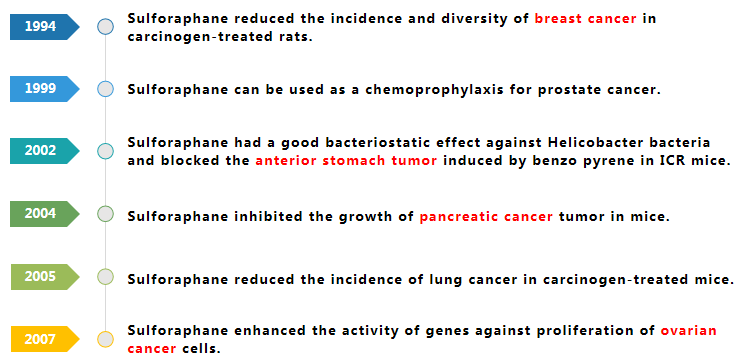In 1994, scholars from Johns Hopkins university school of medicine confirmed that sulforaphane can reduce the incidence and diversity of tumor in rats treated by carcinogens(https://pubmed.ncbi.nlm.nih.gov/8159717/).
In 2013, clinical trials at Hopkins and Oregon State University (NCT: 00982319, NCT: 0843167) both confirmed that sulforaphane can slow the growth of breast cancer cells, especially in patients with early-stage breast cancer.
In 1999, researchers at Stanford university confirmed that sulforaphane can be used as a chemopreventive agent for prostate cancer(https://www.nature.com/articles/4500334).In 2014, the Oregon health and science university published a Ⅱ period clinical findings, sulforaphane significantly reduced the prostate s-pecific antigen levels and reduced the recurrence of prostate cancer after radical resection of the prostate(https://pubmed.ncbi.nlm.nih.gov/25431127/).
In 2002, the animal model test of Johns Hopkins University researchers showed that sulforaphane had good antibacterial effect on Helicobacter, and blocked the benzopyrene induced anterior gastric tumors in ICR mice (https://pubmed.ncbi.nlm.nih.gov/12032331/). In 2009, a clinical trial conducted by Tokyo University of Science, University of Tsukuba, and Johns Hopkins University confirmed that taking broccoli sprouts rich in sulforaphane every day can effectively reduce the gastric colonization of H.pylori and reduce the infection sequelae of H.pylori.(http://europepmc.org/article/MED/19349290).
In 2004, the research of University of Toronto showed that sulforaphane inhibits tumor growth in mice pancreas(http://europepmc.org/article/MED/15486191).
In 2005, a clinical trial conducted by Johns Hopkins University, Qidong Liver Cancer Institute and other institutions showed that sulforaphane can reduce the risk of liver cancer by reducing the amount of aflatoxin in the body and increasing the excretion of air pollutants(https://pubmed.ncbi.nlm.nih.gov/8159717/).
In 2005, Animal experiments conducted by the American Institute for cancer prevention and other institutions showed that sulforaphane can reduce the incidence of lung cancer in mice treated with carcinogens (https://pubmed.ncbi.nlm.nih.gov/16166336/). In 2009, a clinical study completed at Johns Hopkins University showed that sulforaphane had a significant protective effect against lung cancer in smokers. Two clinical studies on lung cancer, published in 2012 and 2014 respectively, showed that taking broccoli sprout beverage containing glucoraphanin and sulforaphane can increase the in vitro excretion rate of benzene (carcinogen) by 61%, and the in vitro excretion rate of acrolein (lung stimulant) by 23%, so as to reduce the risk of lung cancer caused by air pollutants. (https://pubmed.ncbi.nlm.nih.gov/22045030/;https://pubmed.ncbi.nlm.nih.gov/24913818/).
In 2007, a joint research of New York medical school and Harvard Medical School, proved that sulforaphane can enhance the activity of the ovarian cancer cell proliferation resistance gene(http://europepmc.org/article/PMC/2584019).
